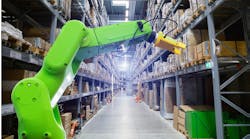The consumer electronics industry is expected to grow at a CAGR of 5% to $1.8 trillion by 2023, with smartphones leading the way. Considering this growth, companies turn to digital solutions to effectively manage complex supply chains. Still, there is a demand for software that generates a comprehensive ledger of transactions so that companies can review all intermediate steps in production. A recently published paper speculates that blockchains will become the industry format for digital supply-chain management solutions.
Blockchain software comprises a sequence of access points that store and transfer encrypted information without passing it though a central control system or central trust points. Various users can interact with the system and view transactions at each point. Thus far, blockchains are the basis of cryptocurrencies like bitcoin, which authorizes the transfer of digital currency from person to person.
But similar to what is envisioned as the Internet of Things, the information technology’s challenges lie in securely transferring encrypted information that is not managed by a central controller or passed through central points of trust. As companies like IBM address these encryption challenges, Blockchains are becoming more eyed for their potential usage in supply-chain management of consumer goods.
By recording electronic signatures from authorized members, or receiving codes embedded in packaging, Blockchain could be used to track steps ranging from raw-materials sourcing to transport between distributors, retailers, and suppliers. Through automatic solutions and authorization, the information technology could enable final vendors to more easily align purchases with ethical sourcing and labor standards, reduce counterfeit items and fraud, and validate the cost of final products like smartphone, smart TVs, and tablets.
The paper lists emerging technology that uses Blockchain-based tracking solutions for supply-chain management of consumer goods. Through its LinuxONE system, IBM is developing a Cloud-based blockchain-type service that tracks high-value items through complex supply chains; the Chai Wine Vault system powered by London-based company, Everledger is set up to track the wine supply chain. Everledger has also created Blockchain software that prevents theft in the diamond industry, and improves the alignment of supply-chain practices with ethical standards in Africa.
The EU also sees the value in Blockchain, and has partnered with startup Kouvola Innovation and IBM to identify pallets with RFID tags so they can register information on a blockchain ledger as they move through the supply chain. In 2016, Kouvola created another automated logging system called SmartLog, which sends location-specific information to enterprise-resource-planning systems through smart contracts built into shipping containers. The paper also cites BlockVerify, which uses digital identity tools that track and verify property as an anti-counterfeit solution.
As supply chain management becomes more complex, ethical sourcing is held at higher esteems by governments and consumers, and information technology and data encryption becomes more advanced, it is likely that the CE industry will see more Blockchain-based solutions in the supply chain.









